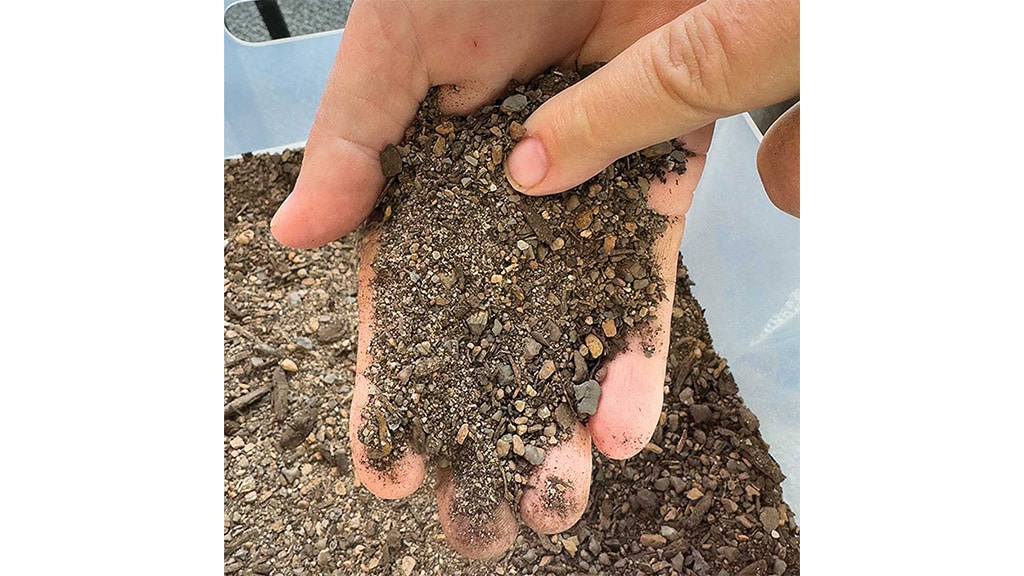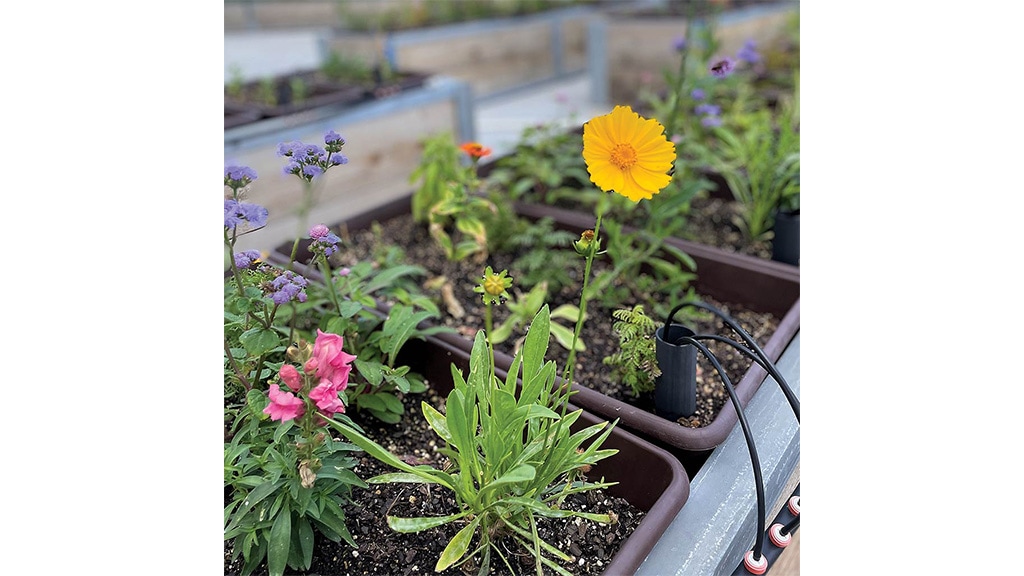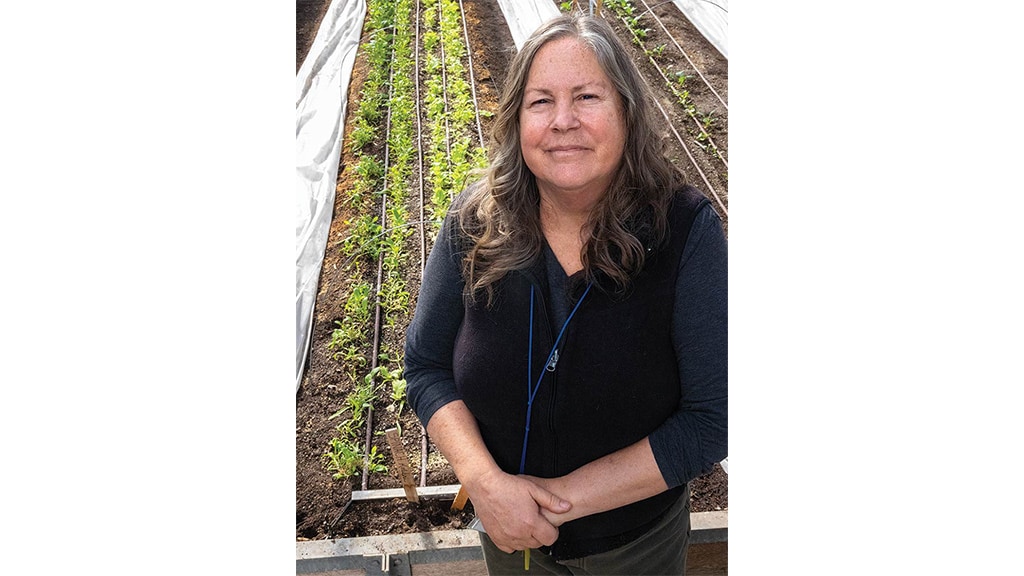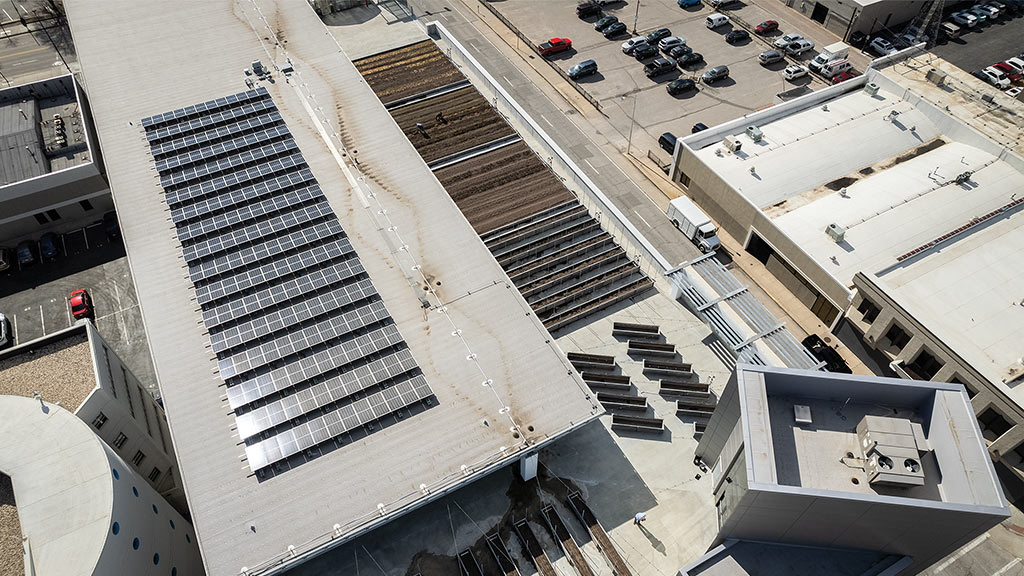
Carrots destined for restaurants or the Maize school district are harvested by Heather Waldorf, the RISE Farms' manager. Nearly 30 Wichita eateries buy RISE Farms' produce.
Agriculture, Sustainability June 01, 2024
Car Park Produce
RISE Farm is Wichita's first rooftop farm.
by Bill Spiegel
"Have you ever taken an elevator to a farm before?" asks Leah Dannar-Garcia as she waves a security badge to enter the lift inside Fidelity Bank's mixed-use car park in downtown Wichita, Kansas.
On the fifth floor, the doors open to RISE Farms: a 15,000 square feet microfarm, featuring produce and flowers.
The rooftop farm—one of the largest in the Midwest—came about thanks to a collision of ideas, Dannar-Garcia says. Fidelity Bank built the structure in 2020, anticipating retail space and a restaurant could occupy the bottom floor. While Aaron Bastian, Fidelity's president and chief executive officer was meeting with potential tenants, one suggested growing fresh produce on the roof.
Enter Dannar-Garcia, who had built Firefly Farm in east Wichita into a thriving business selling fresh produce to local eateries.
"When they asked me to do this, I spent about six months researching, calling other rooftop farmers and visited rooftop farms in Chicago and St. Louis," says Dannar-Garcia, who collaborated with an architect, engineer, and construction company from the beginning of the project.
She shares the space with 204 solar panels that supply energy to the entire building, including RISE Farms' electric delivery van.
Fifth floor farming. A square foot of soil weighs more than a square foot of a vehicle, so she had to replace soil with a new medium. Crops are transplanted into a mix of rooflite®—crushed and heated shale—plus sand and compost.
Raised beds of varying heights are spread throughout the fifth floor. Irrigation lines run the length of each bed. Emitters within the lines operate several times each day due to the soil's inability to hold water. Each week, plants are fertilized with a foliar product that contains mycorrhizae bacteria.
"We wanted to capture and recycle rainwater so that we would be 100% sustainable," Dannar-Garcia says, but food safety regulations didn't allow.
The farm is divided into five strategically located zones. Fidelity Bank built an event room on the top floor; therefore, flowers and fruit trees are located nearby to enhance the aesthetic appeal of the space.
"Plus, locally grown flowers have a high return on investment," she points out.
In all, more than two dozen crops of all types are grown year-round, yielding an estimated 12,000 pounds of food.
"After 10 years of growing, I have a three-point rule," Dannar-Garcia says. "You have to be able to grow it. If you can grow it, you have to be able to sell it. And third, if you can grow it and sell it, can you make money on it?
"Some crops don't make money. But herbs, flowers, and tomatoes all have good ROI, so that's what we grow," she continues.
All crops are started from seed, and the farm's germination chamber slashes the time it takes for seeds to sprout. From there, seedlings go to a grow tunnel, where they are potted and cared for until rows open up in the raised beds, at which point the crops are transplanted.
Above. Left, RISE Farms' mission is printed on its delivery van. The growing medium is mostly rooflite® (crushed and heated shale), sand, and compost. Flowers offer aesthetic beauty to RISE Farms. Leah Dannar-Garcia founded a rooftop farm in part because she relished the challenge. Barren in the winter, RISE Farms will burst with activity from spring to fall.
Although considered a "micro-farm," RISE requires more people than Dannar-Garcia's Firefly Farm, which occupies more than twice the space. In all, she has nearly a dozen employees.
"I'm a for-profit business," she explains. "The whole key is turning over crops, so we designed a very intense crop plan."
RISE Farms sells wholesale, retail, and to restaurants. One Wichita-area school district is buying fresh vegetables and greens from the business; RISE also supplies the Kansas Food Bank with fresh produce.
The opportunity for specialty crop farmers is huge, says Dannar-Garcia, who is working on curating a food hub for businesses like hers. A decade ago, one-fourth of Wichita's 166 square miles was considered a food desert. Her dream is to create a food hub collective that connects farmers and ranchers with end-users who buy in bulk, like school districts or hospitals. That could remediate the food desert challenge, plus provide opportunities for like-minded farmers.
"Wichita has several great specialty crop farms, but we're all out here operating individually," she explains.
Using food to empower others is one of her top goals.
"It's a dynamic time to be a specialty crop farmer," she adds. "There are a million reasons that farming is a smart choice right now for young people." ‡
Read More

AGRICULTURE, EDUCATION
Reaching for the Stars
StarWalker Organic Farms shares regenerative story with beef and pork fans nationwide.

AGRICULTURE
Catering to the Market
Eng family finds success anticipating public demand.





